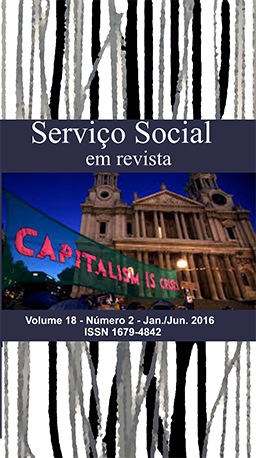The Social Workers and the struggle for better working conditions: notes about the workweek of 30 hours
DOI:
https://doi.org/10.5433/1679-4842.2016v18n2p93Keywords:
Work. Work precariousness. Social worker. Workweek of thirty hoursAbstract
The objective of this article is to analyze how was the setting of the struggle process of the social workers in relation of the 30 hours workweek, having as a base the global transformations driven by the capitalist reorganization that focuses on the work field, intensifying the relations of exploration and precariousness. It is a study of theoretical character that is founded on the production of authors that discuss the theme in the question. For that, is sought lashing in the dialectical method, that allows the understanding of the problematic as part of the historical totality of the material life in whit it is constitute and reproduced. The approach of the relevant questions is done in articulation with the historical scenery of reference, with the social transformations arising from the structural crises of the global capitalism system in its contemporary phase, and with the solutions forwarded by the hegemonic order for the crises, which comes imposing new demands to the workers, including in here the social workers. Therefrom the research concludes that the sanction of the 30 hour law - law nº 12.317/2010 was possible with that political articulation of representative entities, with the workers, however, it notes that there are other struggles to be deal with for better work and life conditions.Downloads
Downloads
Published
How to Cite
Issue
Section
License
Copyright (c) 2016 Serviço Social em Revista

This work is licensed under a Creative Commons Attribution-NonCommercial-NoDerivatives 4.0 International License.
A revista se reserva o direito de efetuar, nos originais, alterações de ordem normativa, ortográfica e gramatical, com vistas a manter o padrão culto da língua e a credibilidade do veículo. Respeitará, no entanto, o estilo de escrever dos autores. Alterações, correções ou sugestões de ordem conceitual serão encaminhadas aos autores, quando necessário. Nesses casos, os artigos, depois de adequados, deverão ser submetidos a nova apreciação. As provas finais não serão encaminhadas aos autores. Os trabalhos publicados passam a ser propriedade da revista Serviço Social em Revista, ficando sua reimpressão total ou parcial sujeita a autorização expressa da revista. Em todas as citações posteriores, deverá ser consignada a fonte original de publicação, no caso a Serviço Social em Revista. As opiniões emitidas pelos autores dos artigos são de sua exclusiva responsabilidade.















